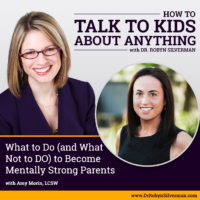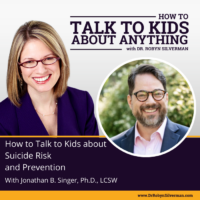Podcast: Play in new window | Download
Subscribe: Apple Podcasts | RSS | More
What to do (and what not to do) to become mentally strong parents
This podcast is the second episode with guest, Amy Morin, (1st one is here) who talks about her new book, coming out next week (September 19th), 13 Things Mentally Strong Parents Don’t Do in today’s episode.
Special Guest: Amy Morin
Amy Morin a psychotherapist and the international bestselling author of 13 Things Mentally Strong People Don’t Do. Her forthcoming 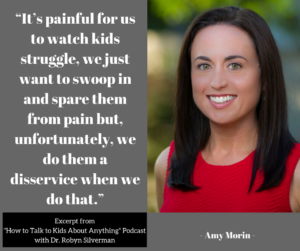 book, 13 Things Mentally Strong Parents Don’t Do, goes on sale September 19. Amy also teaches at Northeastern University and she’s a regular contributor to Forbes, Inc., Verywell, and Psychology Today. Her advice has been featured by numerous media outlets including Oprah.com, Parents, Business Insider, Success Magazine, and Fox News and she stars in a RedBull TV show called Visions of Greatness.
book, 13 Things Mentally Strong Parents Don’t Do, goes on sale September 19. Amy also teaches at Northeastern University and she’s a regular contributor to Forbes, Inc., Verywell, and Psychology Today. Her advice has been featured by numerous media outlets including Oprah.com, Parents, Business Insider, Success Magazine, and Fox News and she stars in a RedBull TV show called Visions of Greatness.
Mentally strong people have good habits, make informed choices and persevere even when the going gets tough. But what habits have mentally strong people dropped to make room for personal growth and meaningful gain? Many people have told Amy Morin, who authored the blockbuster “13 Things Mentally Strong People Don’t Do” (which you can hear about here LINK), that they wished they had learned these 13 things to avoid earlier in life—and how, as parents, could they be a better example to their kids? How could they actively instill positive habits (and avoid instilling negative habits) in their children that could compromise their mental strength? This podcast has the answers.
The podcast provides:
- Tips: How parents (and teachers) can be good role models of mental strength
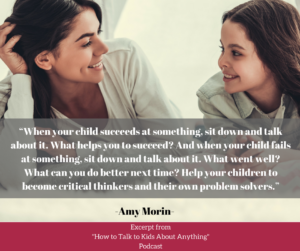
- The benefits of teaching kids mental strength (rather than rescuing or focusing on just academics/sports)
- Some of the key habits parents must drop in order to ensure that their children learn mental strength.
- Scripts: How to talk to your child about changes or new rules that you feel you need to make to ensure mental strength.
- What to do when you need support, as a parent, so that you stay strong when the going gets tough.
- How to use Amy’s “connect the dots” technique, debriefing technique and true vs blue thoughts technique.
Important Messages:
- When parents aren’t working on mental strength, children don’t work on it.
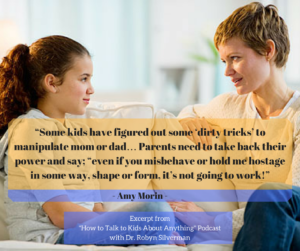
- 60% of college students said they wished their parents had taught them emotional skills. They need these skills- to reach their potential.
- For many parents, it can be hard to watch kids fail without rescuing but when parents keep propping kids up, they don’t learn mental strength.
- It’s becoming more common for parents to intervene even when the children become young adults- going on job interviews, negotiating salaries- because they can’t let their child fail since they never have done so in the past.
- Parents need to teach kids to drop a victim mentality and that they don’t have to give away their power.
- Parents need to show that, while they listen to their child’s needs and wants, parents are ultimately make the decisions.
- Debrief with your child so that they make mental notes of what they did well and what they can improve for the next time.
- Look at your role in a child’s life- are you a protector or a guide? If you can be more of a guide- you can help turn hurdles into learning opportunities.
- Ask your child; is this a true or blue thought?
Notable Quotables:
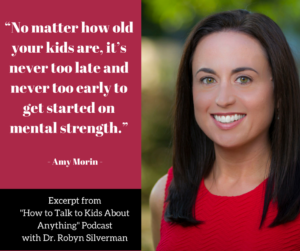 “We are seeing these kids who are getting through high school because their parents are propping them up but then they are just not ready for the real world when their parents aren’t there to monitor their every move.”
“We are seeing these kids who are getting through high school because their parents are propping them up but then they are just not ready for the real world when their parents aren’t there to monitor their every move.”- “It’s painful for us to watch kids struggle, we just want to swoop in and spare them from pain but, unfortunately, we do them a disservice when we do that.”
- “Some kids have figured out some ‘dirty tricks’ to manipulate mom or dad… Parents need to take back their power and say; “even if you misbehave or hold me hostage in some way, shape or form, it’s not going to work!”
- When you take back your power and say ‘here’s the rules, here’s the consequences and I’m going to enforce them’ after a while, that’s going to help you create a stronger bond. Your child’s going to know for example, ‘my mom’s in charge’ or ‘my dad’s the leader,” and I can trust that this person is going to make good decisions for us.
- “We want kids to know; ‘My parents have my back. Even though they may not deliver the homework paper, they are thinking
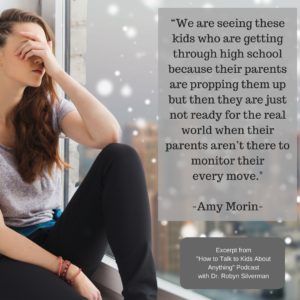 about my future and working to make sure I’m learning the life lessons that I need.”
about my future and working to make sure I’m learning the life lessons that I need.” - “When your child succeeds at something, sit down and talk about it. What helps you to succeed? And when your child fails at something, sit down and talk about it. What went well? What can you do better next time? Help your children to become a critical thinkers and their own problem solvers.”
- “A lot of parents think that their job is to make sure that ‘nothing bad happens to my child. They are protectors. People who are guides are able to say; ‘I know bad things are going to happen but I’m going to help my child learn fro them. And if you can say to yourself; ‘I’m going to work on becoming more of a guide and less of protector, and I’m going to turn all these obstacles and challenges in my child’s life into learning opportunities, your child is going to be so mentally strong by the time he leaves the house that he won’t need you to continue to protect him he’ll have the skills he needs to reach his potential.”
- “No matter how old your kids are, it’s never too late and never too early to get started on mental strength.”


